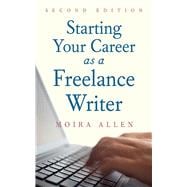If you've always dreamed of making a living as a writer, this book will take you where you want to go. Starting Your Career as a Freelance Writer, Second Edition, demystifies the process of becoming a writer and gives aspiring writers all the tools they need to become successful freelance writers, get their names in print, and start earning a healthy income from writing. Completely revised and updated, the second edition includes an entirely new section on the "online writer," discussing how to set up your own website, whether you need a blog, how to effectively participate in social networking sites, and information on electronic publishing, POD and more.
New chapters provide guidance on writing for international markets and other writing opportunities such as ghostwriting, speech writing, technical writing, copyediting, teaching, etc. This indispensable resource walks writers through the process of developing marketable ideas and then finding appropriate markets for those ideas.
It includes effective tips on how to set writing goals; make time for writing; hone research and interview techniques; create outlines and first drafts, approach editors (online and offline), and prepare and submit material. Writers will also discover the vital business issues of freelancing such as rights and contracts, plus how to manage income, expenses, and taxes. Author Moira Allen has more than 30 years experience both as a freelance writer and as an editor; her tips come from a keen understanding of what works from both sides of the desk.
Whether readers are looking to support themselves as full-time freelancers or supplement an existing career, no one wanting to make money as a writer can afford to be without this book.
“Few know the ins and outs of freelancing better than Moira Allen. In her comprehensive guide, she walks you through everything you need to know to get started and become successful. This is an essential read for freelance writers.” -Jeff Reich, editor, The Writer magazine
“This book is a clear, comprehensive, example packed, practical, and wise compendium of advice for any freelancer. Don’t be fooled by the title Moira Allen has given us an excellent introduction for beginners and an invaluable reference for experienced writers. My copy is already stickied with reminders.”-Noelle Sterne, editor, writing coach, and author of Trust Your Life: Forgive Yourself and Go After Your Dreams
“Moira Allen's advice is sound, practical, and comprehensive. Her long history of helping writers makes this book invaluable to the beginning freelancer.”-Barbara Florio Graham, author and publishing consultant








